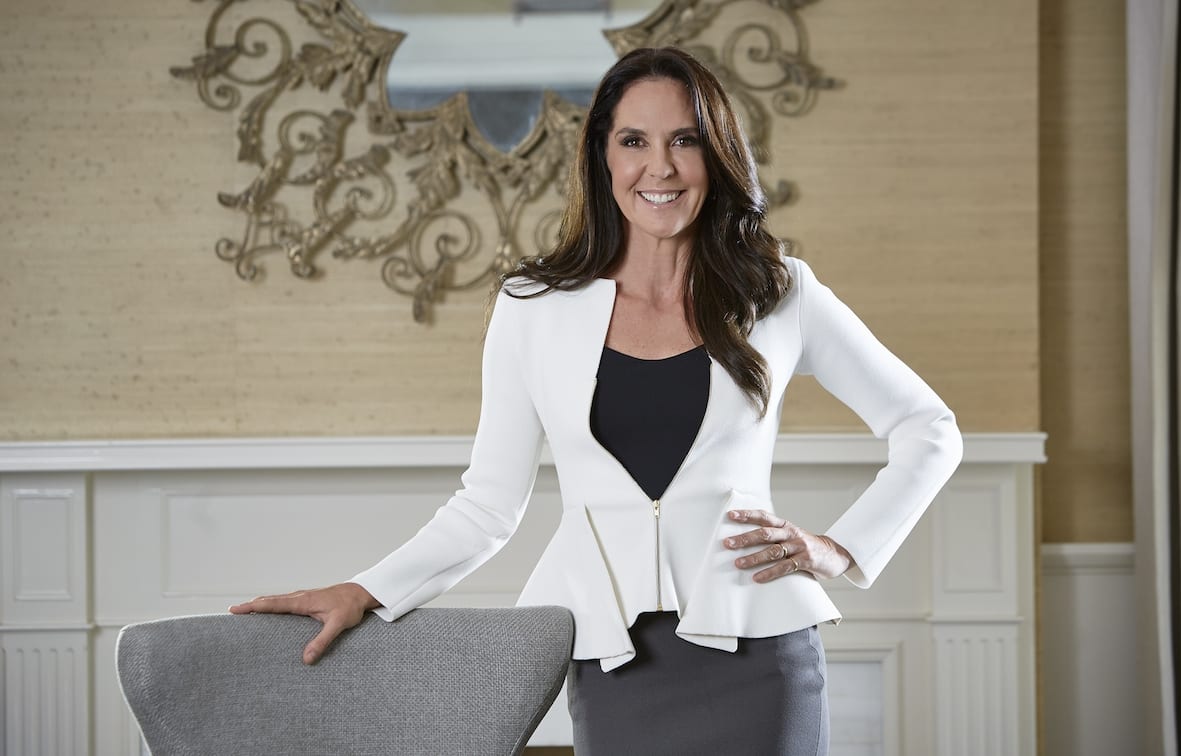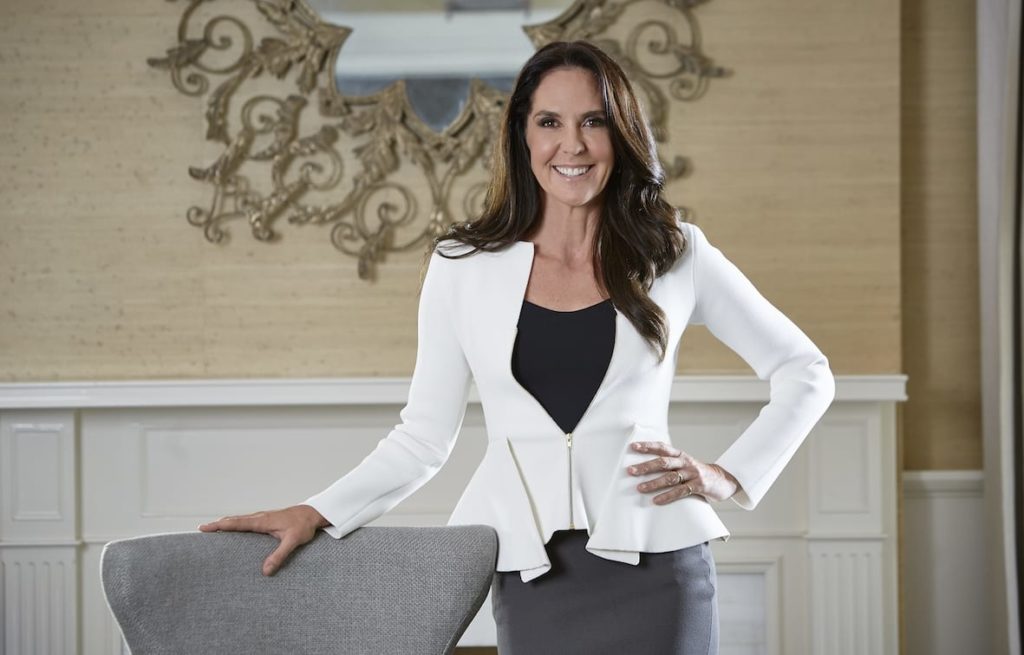
Janine Allis became a household name when she founded Boost Juice in 2000. At the time Janine was a mother of 3 young boys, with no prior business experience, but her juice bars transformed Australia’s takeaway food retail sector.
Janine’s attitude is all can-do: she wants people who soar above the line, change the language and seek solutions. Along with positive energy, Janine believes sacrifice and failure are essential to long- term success. Adding a daughter along the way, today she is Executive Director of Retail Zoo, as well as a ‘shark’ on TV show Shark Tank Australia, where budding entrepreneurs present ideas and inventions to 5 industry leaders.
In this edited extract from Women of Influence, she speaks to Gillian Fox about successful entrepreneurship, networking – when you have no time – failure, why we should aim to be SOAR people over VERBs (all explained below), and building a career with a family.
How do you think young women wanting to follow in your footsteps can implement solid strategies for success?
I do see my business life as a journey. You have to plan effectively and you have to make sure you have the right resources. If you’re going across the Nullarbor, have you got enough water? You’ve got to think about those sorts of things on your journey.
What do you think emerging female leaders can take from your leadership style?
Leadership changes as you evolve through business. I’m respectful, but demanding. If you tell me you’re going to deliver something at six o’clock on Tuesday, you should deliver it at six o’clock on Tuesday. I want honesty, transparency and respect. I want people to do what they say they’re going to do. I want people to want to be part of a team that wants to be the best team.
How much energy should women invest in networking from the outset?
When I started boost I had 3 kids. Starting a business, there wasn’t any time for networking or knowing whether this business was good, bad or indifferent. I had nothing to compare it to because I never spoke to anyone.
That sounds stressful and isolating – how would you advise the next generation of accidental entrepreneurs to address that if they are themselves operating alone?
When we were about 16 stores, Flight Centre co-founder and BRW Rich 200 member, Geoff Harris came into the business. He was a wealth of experience. My husband has also been a great source to bounce off. But really, that’s been limited.
It doesn’t mean that I haven’t picked up the phone and called someone ahead of us in the journey and said, “Look, I’ll buy you a coffee. Can I pick your brains?” They’ve been incredibly open, candid and generous with their information.
What would you say to women who feel like giving up after one damaging experience?
One of the shames of people starting a business and failing, then never doing it again is that they’ve got this wealth of knowledge: all the things you shouldn’t do. They could take that experience into their next business, but they’ve given up.
I didn’t have a formal education, but I was educated every time I made a bad decision: it always costs money. That was my course. I did a course in hiring the wrong accountant. I did a course in choosing the wrong site. It’s those things that go wrong that make a business great.
We hear the term ‘having it all’ a lot these days; you’ve certainly been through it all – do you think women need to prepare themselves for sacrifices along the way?
Sacrifice is the reality. It’s no different to someone wanting to be an Olympian. To get there, they have to get up at five o’clock in the morning. They have to eat certain foods. They have to go to bed early. They have to do all these things; they can’t go to the pub and party all night. They just can’t. If they want to achieve that goal, they have to sacrifice.
It probably doesn’t seem like a sacrifice because of their focus and passion on that goal. Business is no different.
You are so limited with time. Every single second of the day is utilised for something to do with the business.
How can up and coming female leaders help drive the change to more exible workplaces?
We’re the only ones who can give birth. Until that changes, those challenges are still there for us. I don’t think that’s going to change in the near future.
My husband has an equal part in our family. He does lunches and dinner and I do other things. My sons see that. Now my sons say, “Well, that’s the partner I’m going to have, and of course I’m going to support her in the workforce, because that’s how it works.”
It’s really this generation that’s smashing it. There are more of us saying, “You can be whatever you want to be.” There are so many exceptional women who are great ambassadors for the young women coming through saying, “Of course I can do that.”
As one of those ambassadors, what do you think separates you from people who don’t achieve as much?
It wasn’t unbelievable confidence in myself; I was naïve. I didn’t know how hard it was and the challenges that were coming. The ability to problem solve along the journey helped. I didn’t do a business course, but I did a business course called Boost. It has taught me every aspect of the business. I think it was having that curious mind that says: “You know what? I’m going to find a way.”
For me, it’s about an attitude. I think there are two types of people: I call them VERB (Victim, Entitled, Rescue, Blame) and SOAR (Solutions, Ownership, Accountability, Responsibility).
Could you please expand on a VERB person?
A VERB is someone who is a victim. We all know them. They say things like: “Poor me,” “I can’t do anything right”. A VERB is an entitled person who says, “I’ve been in a job 10 years, I deserve a promotion.” They are someone who needs to be rescued; they never come to you with solutions. They want you to have the answers. They are the people who play the blame game and aren’t honest enough to say, “The problem is me.”
Which leads us to the second type: the SOAR person…
SOAR people communicate and focus on positivity. I call it soaring above the line. These are people who come with solutions, not problems. They take ownership of everything they do. They’re accountable and responsible. If you can really SOAR, problems will still be there, but how you deal with them is completely different. Success in life – relationships and everything else – will come to you because you’ll attract it.
I think I’m a SOAR person. That’s why the journey has unfolded the way it has. Success comes with luck, picking the right partner in life, and a lot of other things, but it’s also having that SOAR attitude.
In practical terms, what strategies helped you run your family alongside a very demanding business schedule? How have you managed?
I’ve managed poorly! When I started Boost, I had Riley, my third child, who was 7-months old. He was still on the breast. For me, it was setting myself up to succeed. I worked from home for the first two years. My mum has been an enormous help. She couldn’t think of anything better than coming to my house every day and looking after my kids, and I couldn’t think of anything better than her coming to my house and looking after my kids. I was very, very lucky.
Can you suggest a sanity check for women who are in the thick of that period right now?
Life is a pendulum. Often, I get it out of whack. Often, I’m travelling all the time; I’m barely seeing the kids and hating myself for it. Other times, I’m spending too much there and the business is suffering. It’s constantly trying to get that balance. I remember one time I was completely out of balance with the kids and I said, “Right, what can I do?”
I read the whole Harry Potter series to them at night. I thought, “Okay, this is going to be my time with them.” Hopefully that’s embedded in their brains: “You did all this wrong…but at least you did that.”
I look at my kids now and they’re 24, 18 and 17. Then I’ve got my midlife crisis: she’s 7. They are great kids. It’s a happy household. Right or wrong, for me it’s been a good journey.
How difficult do you think it is for women to look after themselves while they’re split between two fronts?
The early days, between 30 and 40 years old, was a blur. When I turned 40, I thought, “Right, I need to start getting a little bit more balance.” That was the era of my fourth child, my daughter, Tahlia.
It was the year that I took up yoga, surfing and horse riding. There was no life balance prior – and there’s nothing wrong with that. You may not succeed with your business or take it to the heights that it might reach if you don’t give everything for it.
Women’s Agenda readers can download an exclusive preview of Woman of Influence ahead of the official launch of the book on May 17, 2016. To download your exclusive preview, simply visit here.
Check out more from this series: Tracey Fellows on why leadership is like love.


